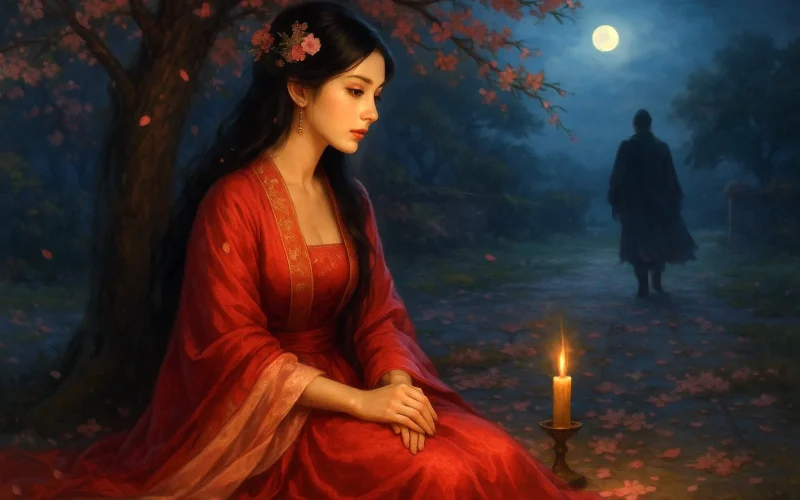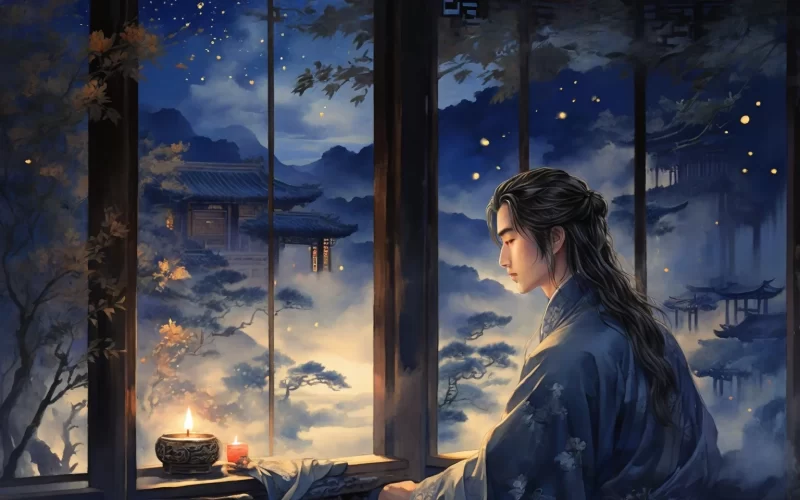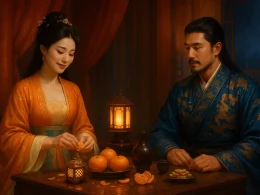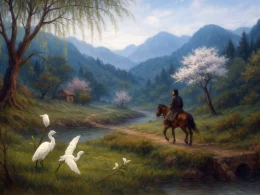It's difficult for us to meet and hard to part;
The east wind is too weak to revive flowers dead.
Spring silkworm till its death spins silk from love-sick heart;
A candle but when burned out has no tears to shed.
At dawn I'm grieved to think your mirrored hair turns grey;
At night you would feel cold while I croon by moonlight.
To the three fairy hills it is not a long way.
Would the blue birds oft fly to see you on the height?
Original Poem:
「无题 · 相见时难别亦难」
李商隐
相见时难别亦难,东风无力百花残。
春蚕到死丝方尽,蜡炬成灰泪始干。
晓镜但愁云鬓改,夜吟应觉月光寒。
蓬山此去无多路,青鸟殷勤为探看。
Interpretation:
This is one of the most famous untitled poems by Li Shangyin, a renowned poet of the Tang Dynasty. Li's untitled poems are celebrated for their delicate emotions and profound imagery. Written from a female perspective, this poem employs vivid imagery and a tender tone to express the pain of separation and the steadfastness of love. While lamenting the helplessness of reality, it also reflects a persistent pursuit of ideals, embodying a strong sense of romanticism.
First Couplet:“相见时难别亦难,东风无力百花残。”
(Meeting is already difficult, but parting is even more agonizing, especially during late spring when the east wind grows weak, and flowers begin to fade.)
The narrator, hindered by obstacles in love, laments the difficulty of meeting and the greater sorrow of parting. The imagery of wilting flowers in late spring accentuates their inner grief and helplessness.
Second Couplet:“春蚕到死丝方尽,蜡炬成灰泪始干。”
(Spring silkworms only cease spinning when they die, and candles shed their tears until their flame extinguishes into ash.)
This vivid metaphor conveys profound and unwavering devotion. Despite an uncertain future, the narrator pours their entire being into love, symbolizing eternal loyalty and dedication.
Third Couplet:“晓镜但愁云鬓改,夜吟应觉月光寒。”
(Gazing into the mirror at dawn, I worry my once-black hair has turned grey; in the solitude of night, my poetic laments are accompanied by the cold glow of moonlight.)
The narrator’s sorrow and longing are illustrated through images of aging and sleepless nights. The blending of nature’s chill and emotional anguish enhances the depth of their melancholy.
Fourth Couplet:“蓬山此去无多路,青鸟殷勤为探看。”
(The mystical Mount Penglai seems close, yet there is no way to reach it. I can only rely on the attentive bluebird to convey my longing.)
By invoking mythological imagery, the poem reveals a yearning for reunion amidst the harshness of reality. The bluebird, a symbol of hope and connection, underscores both the narrator’s desperate hope and their overwhelming solitude.
Stylistic Features:
- Rich Imagery, Deep Emotions: Metaphors like silkworms and candles vividly portray the narrator’s undying devotion, intensifying the poignancy of their unfulfilled love.
- Fusion of Emotion and Scenery: The fading blossoms and aging reflection intertwine external landscapes with internal turmoil, creating a layered emotional resonance.
- Subtle Use of Allusions: References to the bluebird and Mount Penglai enrich the poem’s romantic and ethereal quality while amplifying its themes of separation and longing.
- Compact Structure, Gradual Climax: The poem evolves from lamenting separation to expressing steadfast love, then transitions into a longing for reunion, crafting a rhythmic emotional crescendo.
Overall Appreciation:
This poem’s intricate emotions and profound imagery make it a classic in Chinese poetry about love. Beginning with the pain of separation, the poet unfolds a layered narrative that balances despair with steadfastness. The narrator, trapped in unrelenting longing, embodies both the deep joys and sorrows of love. This tragic yet tender portrayal strikes a chord with readers, making its emotional depth timelessly moving.
Insights:
The poem imparts a timeless truth about love: genuine feelings endure even in the face of obstacles and separation. It reminds readers of the resilience and transformative power of sincere love while exemplifying the art of blending natural imagery with human emotions. Li Shangyin’s work continues to inspire readers with its ability to convey complex sentiments through timeless poetic craftsmanship.
Poem Translator:
Xu Yuan-chong (许渊冲)
About the poet
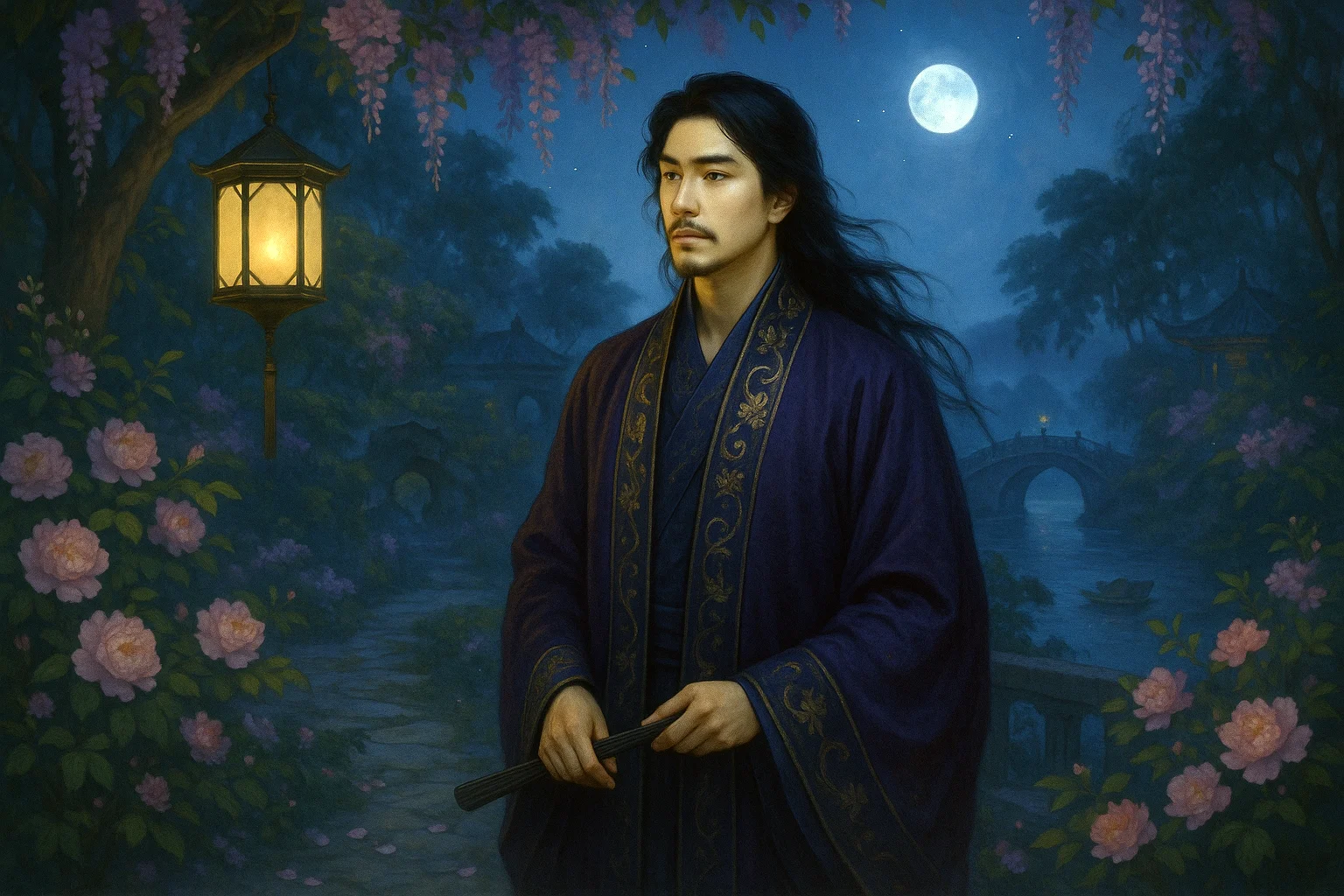
Li Shangyin (李商隐), 813 - 858 AD, was a great poet of the late Tang Dynasty. His poems were on a par with those of Du Mu, and he was known as "Little Li Du". Li Shangyin was a native of Qinyang, Jiaozuo City, Henan Province. When he was a teenager, he lost his father at the age of nine, and was called "Zheshui East and West, half a century of wandering".






